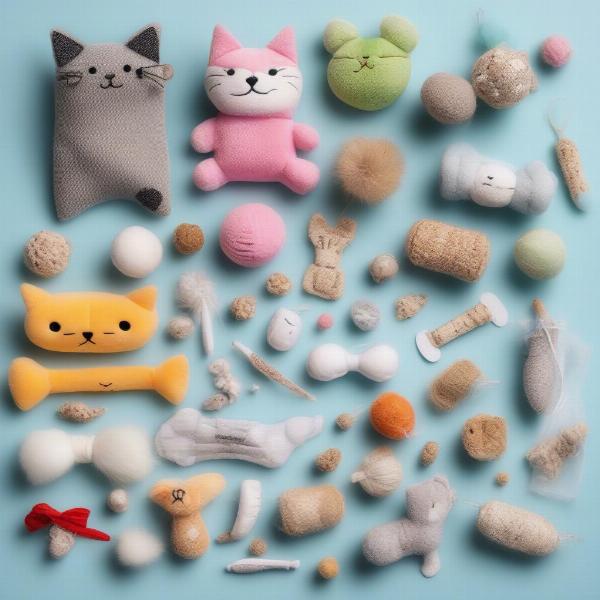Cats and dogs often share a home, and sometimes, they might share each other’s things. But when it comes to dog bones, sharing isn’t caring. While the image of a cat gnawing on a bone might seem amusing, it’s actually quite dangerous. Can cats chew on dog bones? The short answer is no. This article will explore why dog bones are unsuitable for cats and offer safe alternatives for your feline friend.
Why Dog Bones are a No-No for Cats
Dog bones, especially cooked ones, pose several risks to cats. Unlike dogs, cats have smaller, more delicate digestive systems. Cooked bones can splinter easily, causing choking hazards, internal punctures, or blockages in the cat’s esophagus, stomach, or intestines. These situations can lead to serious health complications, requiring costly veterinary intervention and potentially even surgery. Even rawhide bones, marketed as digestible, can swell up in a cat’s stomach, leading to digestive upset and potential obstruction.
Furthermore, dog bones are often flavored and processed with ingredients unsuitable for cats. Artificial flavors, preservatives, and seasonings found in commercial dog bones can be toxic to cats, leading to vomiting, diarrhea, or more severe reactions. Some dog bones also contain high levels of sodium, which can be detrimental to a cat’s health. Certain bone types, like weight-bearing bones from large animals, are also extremely hard and can damage a cat’s teeth.
Safe Chewing Alternatives for Your Cat
Cats, like dogs, have a natural instinct to chew. Chewing helps keep their teeth clean, relieves stress, and provides mental stimulation. Instead of dog bones, offer your cat safe and appropriate chewing alternatives:
- Catnip toys: These toys are filled with catnip, a herb that most cats find irresistible. The texture and scent provide a stimulating chewing experience.
- Catnip sticks: Silvervine sticks provide an alternative for cats who are not attracted by catnip.
- Dental treats: These treats are specifically designed to promote dental health in cats. They have a harder texture that helps scrape away plaque and tartar buildup.
 Safe cat toys for chewing
Safe cat toys for chewing
- Interactive puzzle toys: These toys challenge your cat’s mind and provide a rewarding chewing experience.
- Cardboard scratchers: While primarily used for scratching, some cats enjoy chewing on cardboard.
What to Do If Your Cat Eats a Dog Bone
If your cat manages to eat a dog bone, monitor them closely for any signs of distress, such as vomiting, diarrhea, loss of appetite, or lethargy. If you notice any of these symptoms, contact your veterinarian immediately. Early intervention is crucial in preventing serious complications.
Expert Opinion
Dr. Emily Carter, DVM, a feline specialist at the Feline Wellness Center, explains, “Cats have different nutritional needs and digestive systems compared to dogs. Giving a cat a dog bone can lead to a range of problems from mild digestive upset to life-threatening blockages. Always choose cat-specific chews and toys to ensure your cat’s safety and well-being.”
Dr. Sarah Miller, a veterinary nutritionist, adds, “Many dog bones contain ingredients that are toxic to cats. Xylitol, a common artificial sweetener in dog treats, is particularly dangerous for cats and can cause liver failure. Always double-check the ingredient list before offering any treat to your cat.”
Conclusion
While it might be tempting to let your cat try a dog bone, it’s essential to prioritize their safety. Dog bones are unsuitable for cats and can pose significant health risks. Provide your cat with a variety of safe and stimulating chewing alternatives to keep them happy, healthy, and entertained.
FAQ
- Can cats have small pieces of dog bone? No, even small pieces can splinter and cause problems.
- Are there any types of bones safe for cats? Raw chicken necks and wings can be offered occasionally under supervision but are not a substitute for regular food. Always prioritize commercially available cat-specific treats.
- What should I do if my cat swallows a small piece of bone? Monitor them closely and contact your vet if you notice any unusual symptoms.
- My cat loves chewing on things; what can I give them? Catnip toys, dental treats, and interactive puzzle toys are great alternatives.
- Are rawhide bones safe for cats? No, rawhide can swell in a cat’s stomach and cause blockages.
- My cat stole a dog bone; should I be worried? Yes, monitor them closely and contact your vet if they show any signs of discomfort.
- What are the signs of a blockage in a cat? Vomiting, diarrhea, loss of appetite, lethargy, and abdominal pain.
Related Articles
About ILM Dog
ILM Dog is your go-to resource for reliable, practical advice on all aspects of dog care and ownership. We cover everything from breed selection and puppy care to senior dog health, training, nutrition, and even traveling with your furry friend. As experts in dog health and behavior, ILM Dog is committed to providing high-quality information to help you provide the best possible care for your canine companion. Contact us at [email protected] or +44 20-3965-8624 for more information.